Are they looking for a loyal and intelligent companion? Look no further than miniature poodles! Recognized as one of the best breeds by the American Kennel Club, miniature poodles are smaller but still possess the same elegant look as standard poodles. Their docile temperament makes them great companions for people of all ages, including children. With proper care and attention, these dogs can live long, healthy lives filled with love. Are they wondering about the size of a miniature poodle full grown? They are smaller than toy poodles but just as loving and loyal. Before getting a mini poodle puppy, be aware of potential health issues.
Table of Contents
- 1 Characteristics of Miniature Poodles
- 2 History of the Miniature Poodle
- 3 Pros and Cons of Owning a Miniature Poodle
- 4 Health Tips for Caring for a Miniature Poodle
- 5 Grooming a Miniature Poodle: Tips and Tricks
- 5.1 Regular Brushing is Key to Maintaining a Healthy Coat
- 5.2 Trimming Your Miniature Poodle’s Coat Every Six to Eight Weeks
- 5.3 Professional Grooming Services Can Help Keep Your Miniature Poodle’s Coat in Top Condition
- 5.4 Despite Their Hunting Backgrounds, Miniature Poodles are Indoor Dogs That Require Regular Grooming
- 6 Practical Advice for Training a Miniature Poodle
- 7 Why a Miniature Poodle is an excellent choice for pet lovers
- 8 Related posts:
- 9 Do Poodles Shed Their Puppy Coat?
- 10 Are Poodles Hunting Dogs
- 11 Do Poodles Shed? (Yes but only a little)
- 12 Poodle Puppies (20+ Perfect Pups)
Characteristics of Miniature Poodles
Traits and Personality
Miniature poodles are among the most popular breeds of puppies due to their intelligence, friendly temperament, and adaptability. They are highly trainable and make great companions for families with children or other pets. Additionally, their non-shedding coat makes them a favorite for those with allergies who love dogs.

Coat Care
While miniature poodles are known for their non-shedding coat, they still need regular grooming to prevent matting and tangling. Owners of standard poodles also need to groom their skin regularly. It’s essential to make time to brush at least once a week and take them to a professional groomer every 6-8 weeks. Some owners opt for a “puppy cut” style to make grooming easier for miniature and standard poodles.
Energy Level
Miniature poodles, as puppies, are an active breed that requires daily exercise and mental stimulation. They love going on walks or runs with their owners, playing fetch, or participating in dog sports such as agility or obedience training. Without enough exercise and attention, these dogs can become bored and destructive. It’s important to note that they have a shedding coat, which may cause pain if not properly groomed. Despite this, their owners still love them dearly.
Things to Consider Before Getting a Miniature Poodle
Before adding a miniature poodle puppy to your family, there are some things you should consider. These poodles thrive in homes where they receive plenty of attention from their owners and have ample opportunities for exercise and playtime. They may not be the best fit for people allergic to shedding coats, working long hours outside the home, or living in an apartment without outdoor space.
While miniature poodles are generally healthy dogs, they may need special attention and care for specific health issues such as hip dysplasia, eye problems, and skin allergies. Potential owners should research these health concerns before bringing home a miniature poodle.
History of the Miniature Poodle
Origin and Early Years
The Miniature Poodle, also known as Zwergpudel or Toy Poodle originated in Germany over 500 years ago. They were bred down from Standard Poodles to become smaller hunting dogs that could fit into small spaces to retrieve game. The breed was also popular among the French nobility, where they were used as companions and performers. Miniature Poodles are still famous among families who need a hypoallergenic dog breed due to their low-shedding coat.
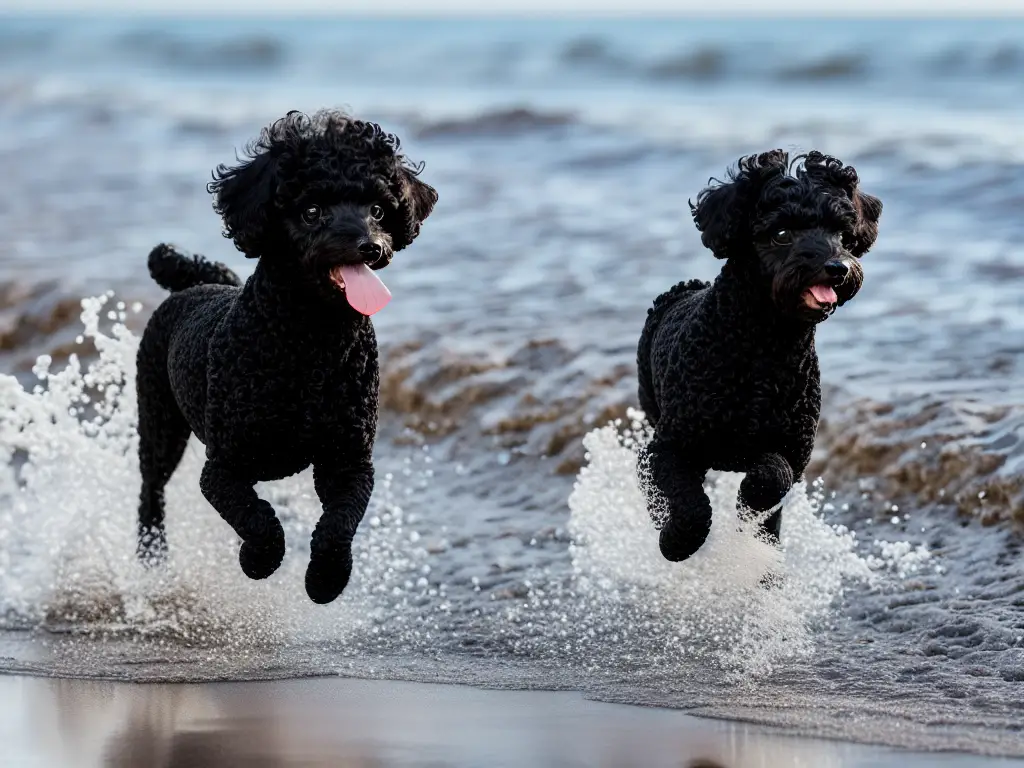
Hunting Dogs
Miniature Poodles were initially bred for hunting purposes. Their small size made them ideal for retrieving games from water or dense vegetation. However, their intelligence and trainability also made them suitable for tasks such as herding and circus performances. Miniature Poodles need regular exercise to maintain their physical and mental health.
Legg-Calve-Perthes Disease
In the past, Miniature Poodles needed to be monitored for a condition known as Legg-Calve-Perthes disease. This degenerative disease affects the hip joint and can cause pain and lameness in affected dogs. Fortunately, this condition has been significantly reduced through selective breeding practices in modern-day Miniature Poodles.
Recognition by AKC
The American Kennel Club (AKC) recognized the Miniature Poodle, a breed of poodles, in 1887. Since then, poodles have become increasingly popular as companion animals and show dogs due to their hypoallergenic coat and intelligence. However, it’s important to note that poodles need regular grooming to maintain their signature curly coats.
Pros and Cons of Owning a Miniature Poodle
Intelligent and Easy to Train
One of the biggest pros of owning a Miniature Poodle is its intelligence. These poodles are incredibly smart, making them easy to train and teach new tricks. They thrive on mental stimulation and love learning new things so training sessions can be an enjoyable bonding experience for both owner and poodle.
Hypoallergenic Breed
Another pro of owning a Miniature Poodle is that they are hypoallergenic, producing less dander than other poodles. This makes them an excellent choice for owners with allergies or sensitivities to pet hair.
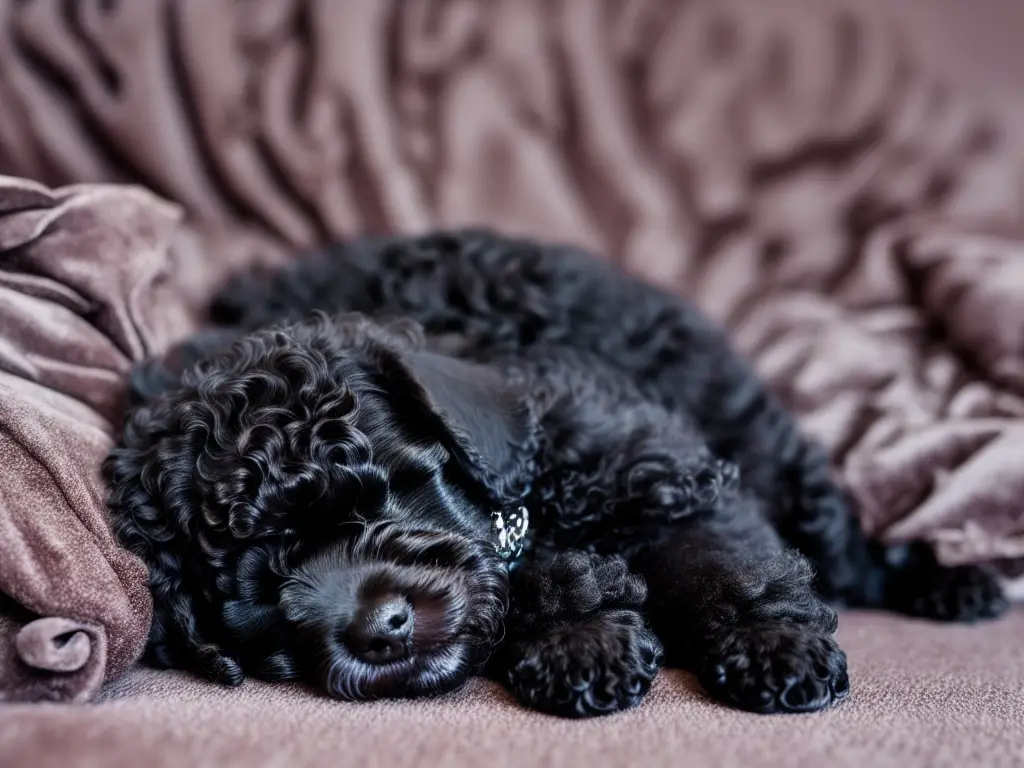
Regular Grooming Required
However, one con of owning a Miniature Poodle is that they require regular grooming to maintain their coat. Their curly fur can become matted if not brushed regularly, so owners should be prepared to invest time in grooming their poodles or take them to a professional groomer.
Health Tips for Caring for a Miniature Poodle
Regular Vet Visits
Regular visits to the veterinarian are essential for maintaining your Miniature Poodle’s health. These visits should include check-ups, vaccinations, and preventative care for poodles, such as flea and tick prevention.
Balanced Diet with High-Quality Dog Food
A balanced diet with high-quality dog food is crucial for your Miniature Poodle’s well-being. Feeding them human food or low-quality dog food can lead to obesity, which can cause joint pain and other health issues. Make sure poodles have access to clean water at all times.
Avoid Overfeeding
Overfeeding can lead to obesity, a common problem in Miniature Poodles. To avoid overfeeding, follow the feeding instructions on the dog food packaging or consult with your veterinarian. It is also essential to monitor their weight regularly.
Eye Disease Prevention
Miniature Poodles are prone to eye diseases such as cataracts and progressive retinal atrophy (PRA). Regular check-ups with your veterinarian can help detect these conditions early on when treatment is most effective.
Perthes Disease Detection
Perthes disease is a condition that affects the hip joint of small breed dogs like Miniature Poodles. Early detection is crucial for successful treatment. If you notice any limping or difficulty walking, take your dog to the vet immediately.
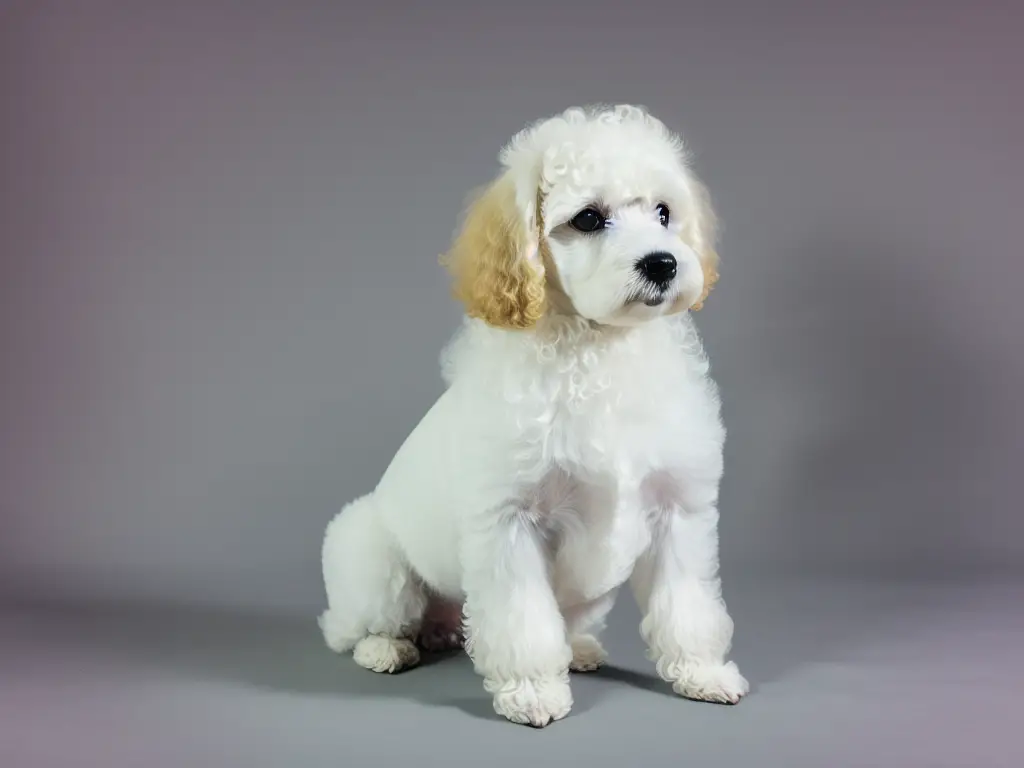
Grooming a Miniature Poodle: Tips and Tricks
Regular Brushing is Key to Maintaining a Healthy Coat
Miniature Poodles have curly, low-shedding coats that require regular brushing. Brushing helps prevent matting and tangling of their hair, which can lead to skin irritation and infection. A slicker brush is the best tool for removing loose hair and preventing tangles. To properly brush your Miniature Poodle, start at the head and work down the body in sections. Be sure to brush against the coat’s grain to remove any dirt or debris that may be trapped.
Trimming Your Miniature Poodle’s Coat Every Six to Eight Weeks
While Miniature Poodles do not shed much, their coats grow continuously and require trimming every six to eight weeks. This will help maintain their coat’s health and appearance while preventing matting. Trimming around their eyes, ears, paws, and tail is essential. You can use clippers or scissors for trimming; however, it is recommended to leave this task to professional groomers with experience with this breed.
Professional Grooming Services Can Help Keep Your Miniature Poodle’s Coat in Top Condition
Professional grooming services can help keep your Miniature Poodle’s coat in top condition. These services, tailored specifically for poodles, include bathing, blow-drying, brushing, trimming nails, cleaning teeth, ear cleaning/plucking (if needed), anal gland expression (if needed), dematting (if necessary), flea/tick treatment (if required), among others.
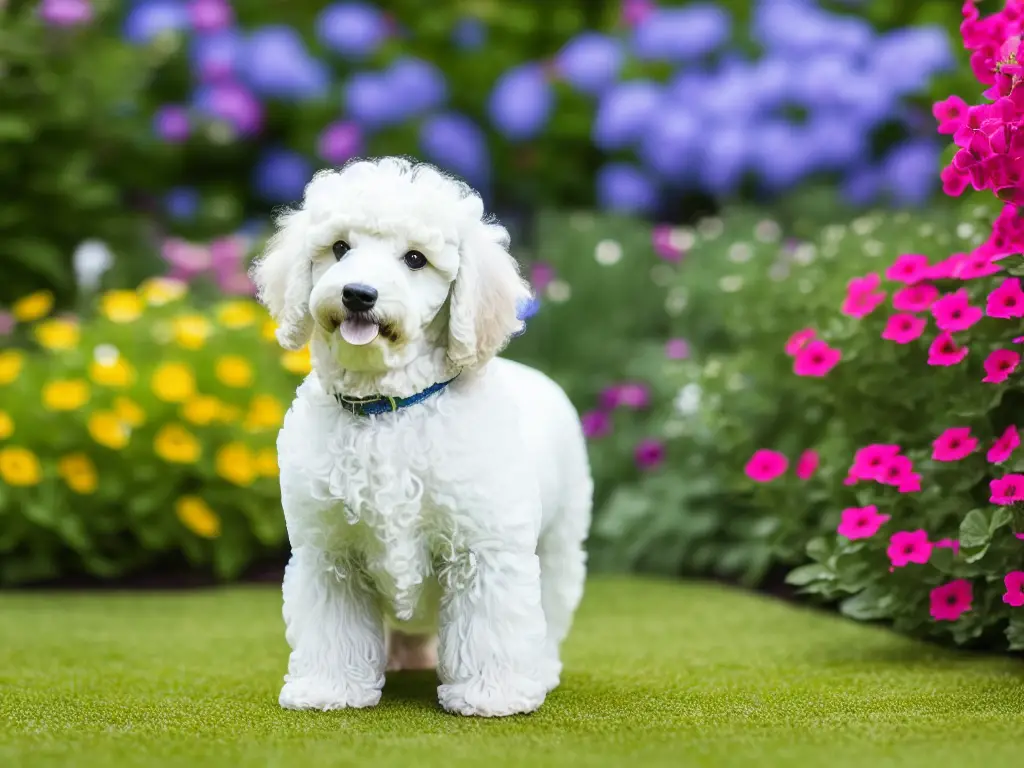
Despite Their Hunting Backgrounds, Miniature Poodles are Indoor Dogs That Require Regular Grooming
Miniature Poodles were originally bred as hunting dogs but are now primarily indoor pets that require regular grooming. They are prone to dental problems due to their small size; thus, cleaning their teeth daily using dog toothpaste is essential. They also need regular exercise and playtime to stay healthy and happy.
Practical Advice for Training a Miniature Poodle
Obedience Training is Crucial for a Well-Behaved Miniature Poodle
Training your miniature poodles to obey basic commands is essential to ensure they are well-behaved and safe. The most critical orders include “sit,” “stay,” “come,” and “heel.” Start using positive reinforcement techniques, such as treats or praise, when your poodles follow a command correctly. Consistency is vital; make sure everyone in the household uses the same powers and rewards.
To reinforce obedience training, enroll your miniature poodle – or any other type – in an obedience class. These classes offer structured training with experienced instructors who can help you teach your dog new skills. They also provide socialization opportunities for your poodles to interact with other dogs and people.
Mental Stimulation Through Training and Play Can Prevent Behavior Problems
Miniature poodles are intelligent dogs that require mental stimulation to prevent boredom and behavior problems. Incorporate training sessions into playtime by teaching your dog new tricks or playing games like hide-and-seek or fetch. Puzzle toys are another great way to stimulate their minds while keeping them entertained.
In addition to training, consider providing your miniature or other poodles with interactive toys that dispense treats or challenge them mentally. These toys can keep poodles occupied for hours while preventing destructive behavior.
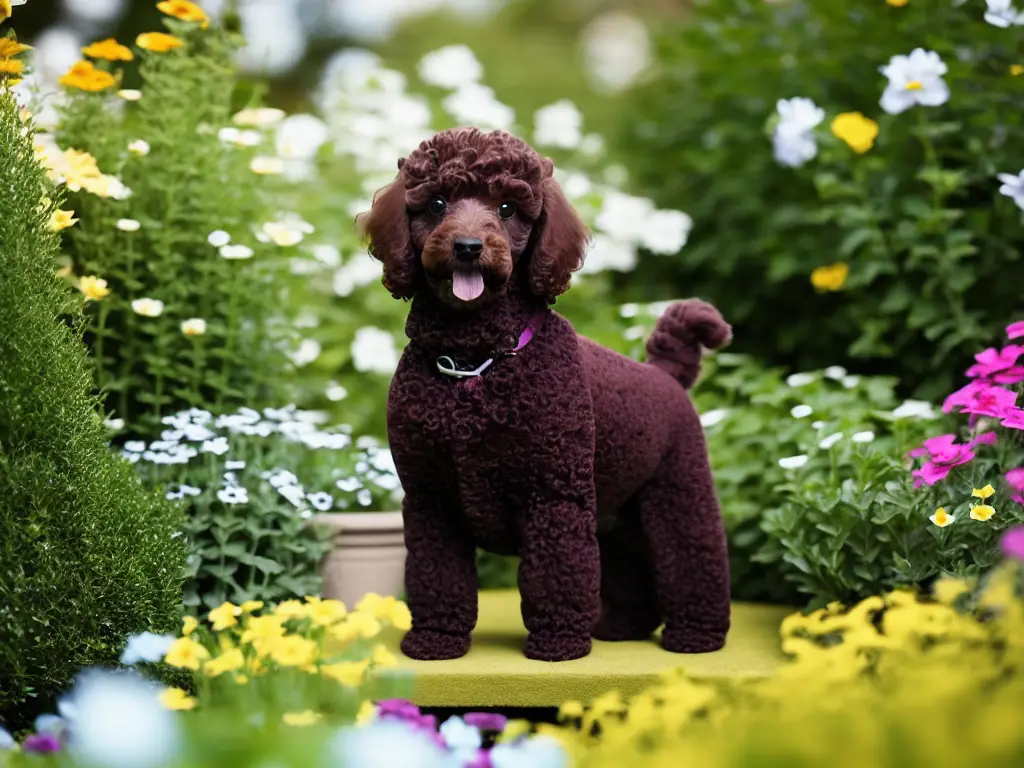
Miniature Poodles Enjoy Swimming and Other Activities That Provide Exercise
Like all dogs, miniature poodles need regular exercise to maintain their physical health and prevent obesity-related health problems. Swimming is an excellent low-impact activity providing cardiovascular exercise and mental stimulation for these water-loving dogs.
Other activities for poodles, including miniature poodle puppies and mini poodles, include walking, running, hiking, and playing fetch. Aim for at least 30 minutes of exercise each day, but remember to start slowly if your mini poodle or miniature poodle puppy is not used to regular exercise.
Why a Miniature Poodle is an excellent choice for pet lovers
In conclusion, owning a Miniature Poodle can be an excellent choice for those looking for an intelligent, loyal, and hypoallergenic companion. These poodles have a long history of being valued pets and are known for their charming personalities and adaptability to different environments.
If you’re considering getting a Miniature Poodle as your next pet, it’s essential to remember the pros and cons of poodle ownership. While poodles make great family pets, they require regular grooming and exercise to stay healthy and happy.
To ensure your Miniature Poodle and other poodles live a long and healthy life, it’s crucial to prioritize their health needs. Regular vet check-ups, proper nutrition, exercise routines, and dental care are all critical components of caring for these dogs.

Remember that training is also essential for poodles. With patience and consistency, you can teach your Miniature Poodle and other poodles basic commands and manners that will make them well-behaved companions.
Overall, if you’re looking for a friendly dog that loves attention but doesn’t shed much hair or dander, the Miniature Poodle might be the perfect pet. Poodles are known for their intelligence and hypoallergenic coat, making them a popular choice for allergy families.
FAQs
Are Miniature Poodles good with children?
Yes! Poodles, including miniature poodle puppies and mini poodles, are known to be affectionate with kids of all ages. However, as with any dog breed, supervision is necessary when young children interact with them.
Do Miniature Poodles get along well with other pets?
Yes! Mini poodles tend to be friendly towards other animals in the household if socialized correctly from an early age.
How often do I need to groom my Miniature Poodle?
Miniature Poodles require frequent grooming every 4-6 weeks due to their curly coat that easily gets tangled or matted.